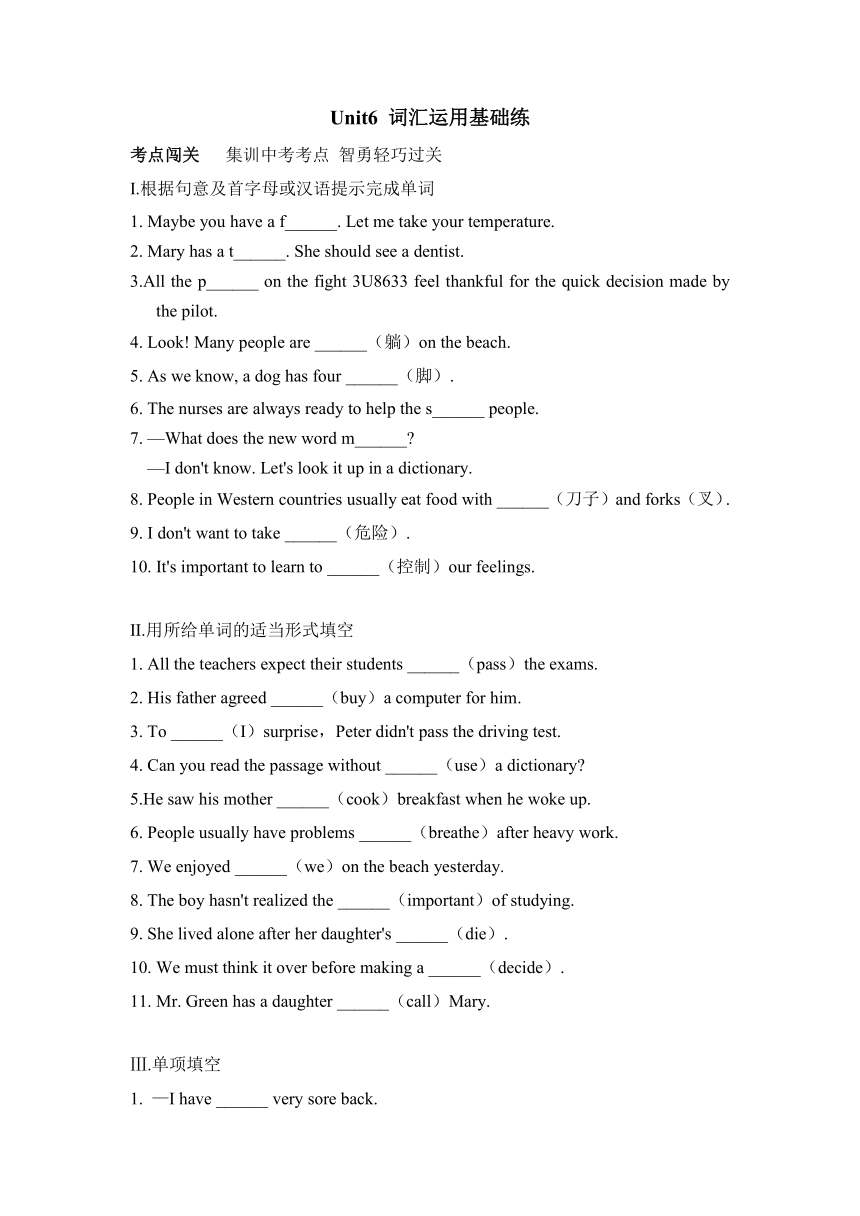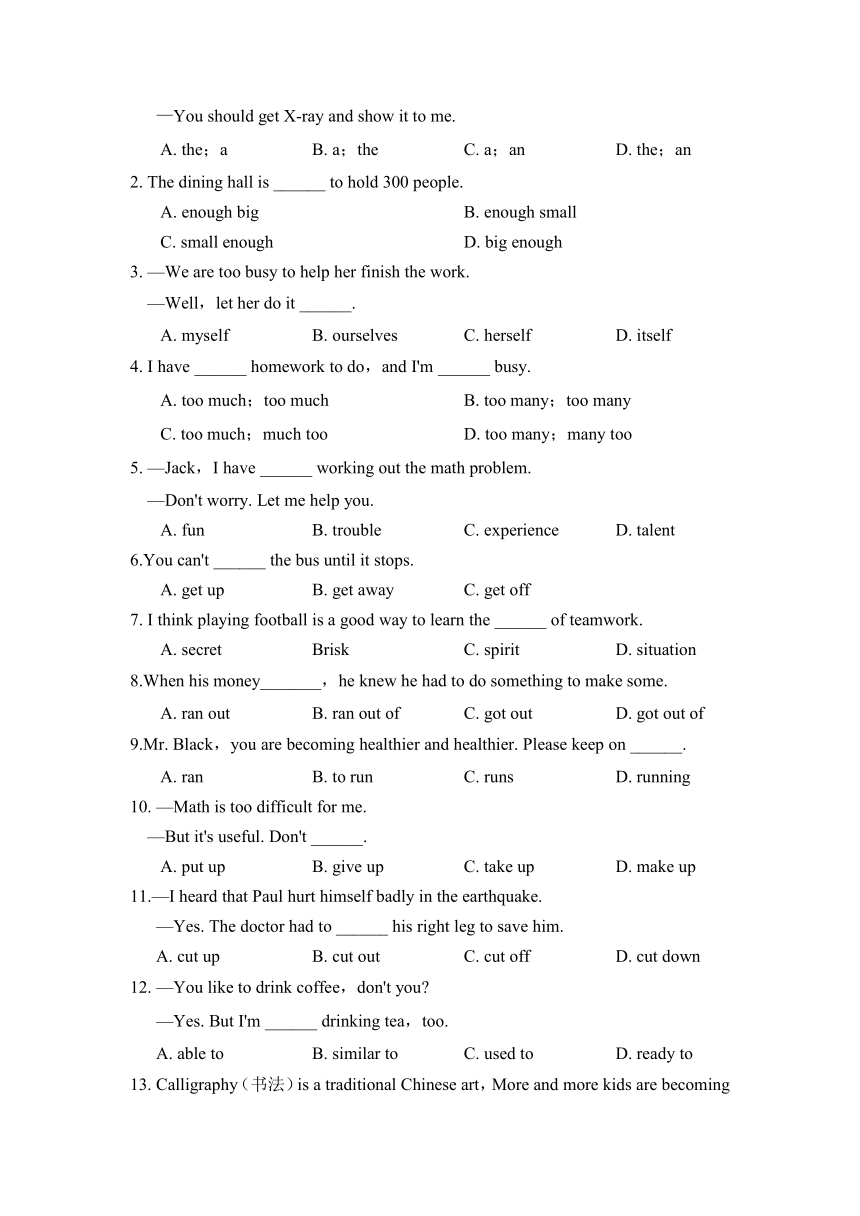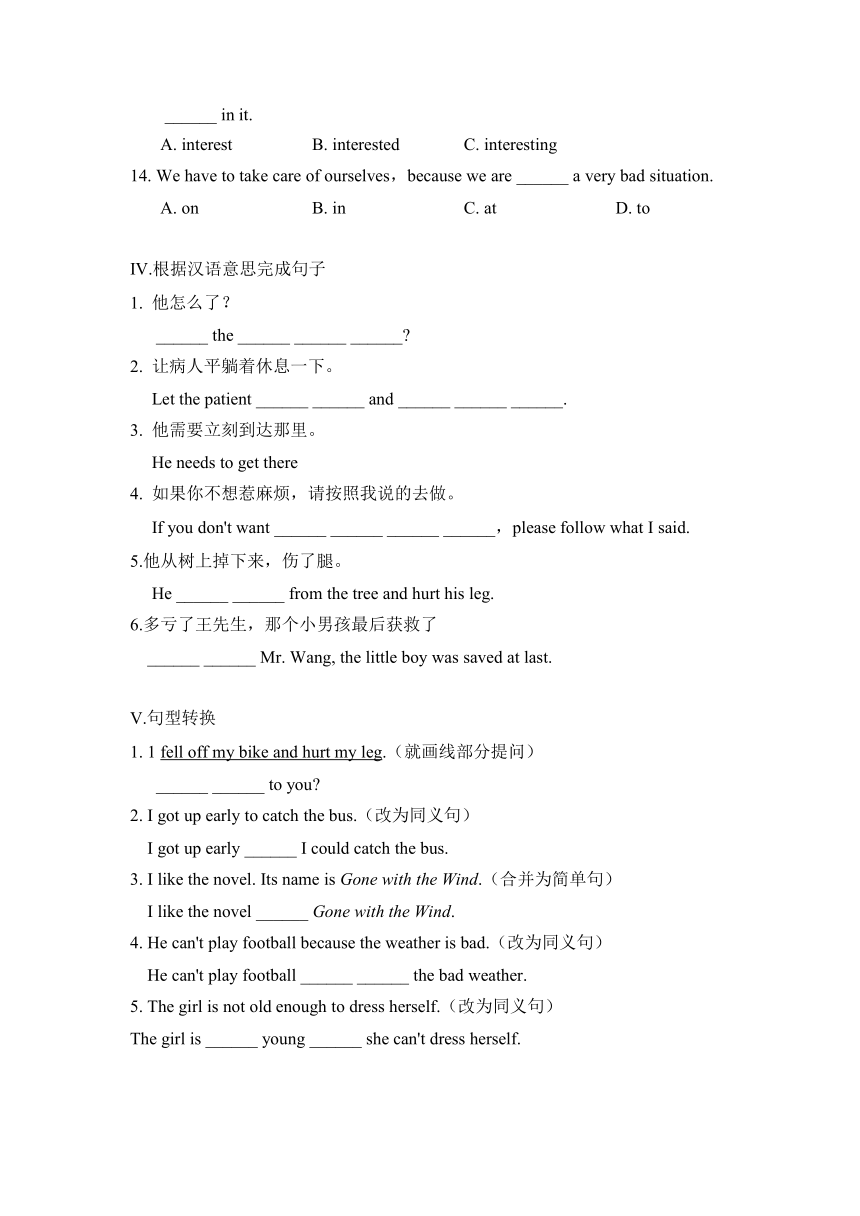鲁教版(五四学制)英语七年级下册 Unit 6 If you go to the party, you'll have a great time! 词汇运用基础练习(含解析)
文档属性
| 名称 | 鲁教版(五四学制)英语七年级下册 Unit 6 If you go to the party, you'll have a great time! 词汇运用基础练习(含解析) |  | |
| 格式 | docx | ||
| 文件大小 | 24.9KB | ||
| 资源类型 | 教案 | ||
| 版本资源 | 鲁教版 | ||
| 科目 | 英语 | ||
| 更新时间 | 2022-07-21 19:58:32 | ||
图片预览



文档简介
Unit6 词汇运用基础练
考点闯关 集训中考考点 智勇轻巧过关
I.根据句意及首字母或汉语提示完成单词
1. Maybe you have a f______. Let me take your temperature.
2. Mary has a t______. She should see a dentist.
3.All the p______ on the fight 3U8633 feel thankful for the quick decision made by the pilot.
4. Look! Many people are ______(躺)on the beach.
5. As we know, a dog has four ______(脚).
6. The nurses are always ready to help the s______ people.
7. —What does the new word m______
—I don't know. Let's look it up in a dictionary.
8. People in Western countries usually eat food with ______(刀子)and forks(叉).
9. I don't want to take ______(危险).
10. It's important to learn to ______(控制)our feelings.
II.用所给单词的适当形式填空
1. All the teachers expect their students ______(pass)the exams.
2. His father agreed ______(buy)a computer for him.
3. To ______(I)surprise,Peter didn't pass the driving test.
4. Can you read the passage without ______(use)a dictionary
5.He saw his mother ______(cook)breakfast when he woke up.
6. People usually have problems ______(breathe)after heavy work.
7. We enjoyed ______(we)on the beach yesterday.
8. The boy hasn't realized the ______(important)of studying.
9. She lived alone after her daughter's ______(die).
10. We must think it over before making a ______(decide).
11. Mr. Green has a daughter ______(call)Mary.
Ⅲ.单项填空
1. —I have ______ very sore back.
—You should get X-ray and show it to me.
A. the;a B. a;the C. a;an D. the;an
2. The dining hall is ______ to hold 300 people.
A. enough big B. enough small
C. small enough D. big enough
3. —We are too busy to help her finish the work.
—Well,let her do it ______.
A. myself B. ourselves C. herself D. itself
4. I have ______ homework to do,and I'm ______ busy.
A. too much;too much B. too many;too many
C. too much;much too D. too many;many too
5. —Jack,I have ______ working out the math problem.
—Don't worry. Let me help you.
A. fun B. trouble C. experience D. talent
6.You can't ______ the bus until it stops.
A. get up B. get away C. get off
7. I think playing football is a good way to learn the ______ of teamwork.
A. secret Brisk C. spirit D. situation
8.When his money_______,he knew he had to do something to make some.
A. ran out B. ran out of C. got out D. got out of
9.Mr. Black,you are becoming healthier and healthier. Please keep on ______.
A. ran B. to run C. runs D. running
10. —Math is too difficult for me.
—But it's useful. Don't ______.
A. put up B. give up C. take up D. make up
11.—I heard that Paul hurt himself badly in the earthquake.
—Yes. The doctor had to ______ his right leg to save him.
A. cut up B. cut out C. cut off D. cut down
12. —You like to drink coffee,don't you
—Yes. But I'm ______ drinking tea,too.
A. able to B. similar to C. used to D. ready to
13. Calligraphy(书法)is a traditional Chinese art,More and more kids are becoming ______ in it.
A. interest B. interested C. interesting
14. We have to take care of ourselves,because we are ______ a very bad situation.
A. on B. in C. at D. to
IV.根据汉语意思完成句子
1. 他怎么了?
______ the ______ ______ ______
2. 让病人平躺着休息一下。
Let the patient ______ ______ and ______ ______ ______.
3. 他需要立刻到达那里。
He needs to get there
4. 如果你不想惹麻烦,请按照我说的去做。
If you don't want ______ ______ ______ ______,please follow what I said.
5.他从树上掉下来,伤了腿。
He ______ ______ from the tree and hurt his leg.
6.多亏了王先生,那个小男孩最后获救了
______ ______ Mr. Wang, the little boy was saved at last.
V.句型转换
1. 1 fell off my bike and hurt my leg.(就画线部分提问)
______ ______ to you
2. I got up early to catch the bus.(改为同义句)
I got up early ______ I could catch the bus.
3. I like the novel. Its name is Gone with the Wind.(合并为简单句)
I like the novel ______ Gone with the Wind.
4. He can't play football because the weather is bad.(改为同义句)
He can't play football ______ ______ the bad weather.
5. The girl is not old enough to dress herself.(改为同义句)
The girl is ______ young ______ she can't dress herself.
参考答案
I. 1. fever take one's temperature意为“量体温",是发烧时常需要做的事情,由此推知前一句句意应为“你可能发烧了",故填fever.
2. toothache 由后句句意"她应该看牙医"可推知玛丽“牙痛",故填toothache.
3. passengers 本题可用“关键信息法”解答。由空格后的两个关键信息on the fight 3U8633和by the pilot可知,本题谈论的是飞机上所有乘客的感受。passenger意为“乘客"。因为前面有all,故用复数形式。
4. lying 由前句"Look! "可知该句为现在进行时,故此处用lie(躺)的现在分词lyingo
5.feet 由空格前的four可知,此处填foot(脚)的复数形式feet
技巧点拨:“牙""脚"变复数,双o变双e。
6. sick 结合常识可知,护士是帮助“病人”的,sick people"病人";be ready to do sth.此处意为“乐意做某事"。
7.mean 本题可用“联系上下文法”解答。由答句句意“我不知道。咱们在词典里查一下吧“知问句句意为”这个生词的意思是什么?",mean"意思是",助动词does后用动词原形。
8.knives knife意为“刀”,是可数名词,由后面的forks为复数可知此处相应地用knife的复数形式knives.
易错警示:knife的复数形式为knives.
9 risks take risks"冒险",为固定短语。
10.control control动词,意为“控制";learn to do sth.意为“学会做某事"
II. 1.to pass expect sb.to do sth.为固定搭配,意为“期望某人做某事"。
2. to buy 本题可用“固定搭配法"解答。agree to do sth.意为"同意做某事",是固定搭配。
3. my to one's surprise为固定搭配,意为“使某人惊讶的是". 因此此处用1对应的形容词性物主代词my。
4.using介词without后应跟v-ing形式。
5.cooking 由when引导的时间状语从句“当他醒来时”可推知,此处指看到“做饭”的动作正在发生,故用see sb.doing sth.结构,意为“看见某人正在做某事"
技巧点拨:若表示see,hear,watch,feel,notice等动词后的动作正在进行,用see/hear/watch/feel/notice sb.doing sth.结构,若表示其后的动作已完成或经常发生,则用seehear/watch/fee/notice sb.do sth.结构。
6.breathing 本题可用“固定搭配法"解答。have problems doing sth.“做某事有困难”,为固定搭配,故用breathing
7.ourselves enjoy oneself"玩得开心”,为固定搭配。
8.importance the importance of是固定短语,意为...重要性”,其中importance是important的名词形式。
9.death 名词所有格后跟名词,die的名词形式为death.
10.decision冠词a后应接名词,decide的名词形式为decision make a decision“下决心;做决定"。
11.called 此处"called +名词是过去分词短语作后置定语,意为“叫…的”。
III. 1.C have a sore back意为“背疼”,为固定短语。X-ray是读音以元音音素开头的单词,此处表泛指,故用不定冠词an。
2.D 本题可用“前后照应法”及“语法分析法"解答。由hold 300 people(容纳300人)可知餐厅足够大,排除B、C两项;enough作副词修饰形容词时,应置于所修饰的形容词之后,故选D
3.C 本题可用“逻辑推理法”解答。上句句意为“我们太忙,不能帮助她完成工作”。由此可推知,空格所在句句意为“让她自己来做吧"。herself意为“她自己",与do的逻辑主语"她”在人称和数上一致,故选C。
4.C本题可用"用法辨析法”解答。too much“太多",常修饰不可数名词;too many“太多”,修饰可数名词复数;much too“太",修饰形容词或副词;无many too的用法。第一个空所选词语修饰不可数名词homework,用too much;第二个空所选词语修饰形容词busy,用much too,故选C.
5.B本题可用“联系上下文法”解答。fun“乐趣;快乐"trouble“问题;苦恼";experience“经验;经历";talent"天资;天赋"。根据下文“别担心,让我来帮你”可知,上文应表达“我解答这道数学题有困难",have trouble doing sth.意为“做某事有困难",故选B
6.C 本题可用“排除法"解答。get up"起床";get away"逃离,逃脱";get off"下车"。结合题意“直到它停下,你才能公共汽车”可首先排除A项;get away常与from连用,再加地点,也可排除;get off"下车”符合题意。
7.C secret"秘密";rsk“风险,危险";spirit"意志,精神";situation“情况,状况”。结合句意“我认为踢足球是学习团队的一个好方法”可知,spirit符合题意。
8.A run out(of)意为“用完,耗尽",符合语境,排除C、D两项。run out为不及物动词短语,其主语通常为物;run out of为及物动词短语,主语为人,后接物作宾语。从句中,主语his money是物,故用ran outo
9.D本题可用“固定搭配法”解答。keep on doing sth.是固定搭配,意为“坚持做某事",故选D
10.B本题可用"联系上下文法”解答,put up意为“搭起,举起";give up意为“放弃";take up意为“开始做";make up意为“编造”。由上文“数学对我来说太难了”和下文中的“但它是有用的"推知,空格所在句意为“不要放弃"。故选B.
11.C cut up“切碎";cut out"删除";cut off"切除";cut down"砍倒"。结合句意中的“医生为了救他不得不他的右腿
可知,应是“切除"右腿,故选C。
12.C be able to意为“可以,能";be similar to意为“与…相似";be used to意为“习惯于";be ready to意为“准备好.
结合选项可知答句句意为..…但我也习惯喝茶"。故选C
13.B 本题可用“固定搭配法"解答。become/be interested in是固定搭配,意为“对…感兴趣"。故选B,句意:书法是一门中国传统艺术,越来越多的孩子正变得对它感兴趣。
14.B insituation意为“在 情况下",是固定搭配。故选B.
IV. 1. What's, matter/trouble with him
2. lie down,take a break
3. right away/at once
4. to get into trouble
5. fell down fall down意为“摔倒,跌落”。由后句可知,此处应用fall的过去式fell.故答案为fell down
6. Thanks to
Section B
V. 1. What happened 画线部分意为“从我的自行车上摔下来伤了腿",对此部分提问用“发生了什么事?",即"What happened to sb.?"
2,so that原句中的动词不定式 to catch the bus 作目的状语;且由空后的I could catch the bus为句子可知,可改为用so that引导目的状语从句,意为“以便,为了…….”。
3.named/called named/called意为“名叫,被称作",name/called...常作后置定语。合并后句意为“我喜欢这部名叫《飘》的小说"。
4,because of because of意为“因为",后接名词、代词或动名词。because后接句子,二者可进行同义句转换。
5.so,that not..nough to do意为“不够 做某事",可与"so..that+否定句”进行同义句转换。
易错警示:“太…而不能"可以用下面三种句型表达:too...to do+not..(反)+enough to do=so..that否定句。
考点闯关 集训中考考点 智勇轻巧过关
I.根据句意及首字母或汉语提示完成单词
1. Maybe you have a f______. Let me take your temperature.
2. Mary has a t______. She should see a dentist.
3.All the p______ on the fight 3U8633 feel thankful for the quick decision made by the pilot.
4. Look! Many people are ______(躺)on the beach.
5. As we know, a dog has four ______(脚).
6. The nurses are always ready to help the s______ people.
7. —What does the new word m______
—I don't know. Let's look it up in a dictionary.
8. People in Western countries usually eat food with ______(刀子)and forks(叉).
9. I don't want to take ______(危险).
10. It's important to learn to ______(控制)our feelings.
II.用所给单词的适当形式填空
1. All the teachers expect their students ______(pass)the exams.
2. His father agreed ______(buy)a computer for him.
3. To ______(I)surprise,Peter didn't pass the driving test.
4. Can you read the passage without ______(use)a dictionary
5.He saw his mother ______(cook)breakfast when he woke up.
6. People usually have problems ______(breathe)after heavy work.
7. We enjoyed ______(we)on the beach yesterday.
8. The boy hasn't realized the ______(important)of studying.
9. She lived alone after her daughter's ______(die).
10. We must think it over before making a ______(decide).
11. Mr. Green has a daughter ______(call)Mary.
Ⅲ.单项填空
1. —I have ______ very sore back.
—You should get X-ray and show it to me.
A. the;a B. a;the C. a;an D. the;an
2. The dining hall is ______ to hold 300 people.
A. enough big B. enough small
C. small enough D. big enough
3. —We are too busy to help her finish the work.
—Well,let her do it ______.
A. myself B. ourselves C. herself D. itself
4. I have ______ homework to do,and I'm ______ busy.
A. too much;too much B. too many;too many
C. too much;much too D. too many;many too
5. —Jack,I have ______ working out the math problem.
—Don't worry. Let me help you.
A. fun B. trouble C. experience D. talent
6.You can't ______ the bus until it stops.
A. get up B. get away C. get off
7. I think playing football is a good way to learn the ______ of teamwork.
A. secret Brisk C. spirit D. situation
8.When his money_______,he knew he had to do something to make some.
A. ran out B. ran out of C. got out D. got out of
9.Mr. Black,you are becoming healthier and healthier. Please keep on ______.
A. ran B. to run C. runs D. running
10. —Math is too difficult for me.
—But it's useful. Don't ______.
A. put up B. give up C. take up D. make up
11.—I heard that Paul hurt himself badly in the earthquake.
—Yes. The doctor had to ______ his right leg to save him.
A. cut up B. cut out C. cut off D. cut down
12. —You like to drink coffee,don't you
—Yes. But I'm ______ drinking tea,too.
A. able to B. similar to C. used to D. ready to
13. Calligraphy(书法)is a traditional Chinese art,More and more kids are becoming ______ in it.
A. interest B. interested C. interesting
14. We have to take care of ourselves,because we are ______ a very bad situation.
A. on B. in C. at D. to
IV.根据汉语意思完成句子
1. 他怎么了?
______ the ______ ______ ______
2. 让病人平躺着休息一下。
Let the patient ______ ______ and ______ ______ ______.
3. 他需要立刻到达那里。
He needs to get there
4. 如果你不想惹麻烦,请按照我说的去做。
If you don't want ______ ______ ______ ______,please follow what I said.
5.他从树上掉下来,伤了腿。
He ______ ______ from the tree and hurt his leg.
6.多亏了王先生,那个小男孩最后获救了
______ ______ Mr. Wang, the little boy was saved at last.
V.句型转换
1. 1 fell off my bike and hurt my leg.(就画线部分提问)
______ ______ to you
2. I got up early to catch the bus.(改为同义句)
I got up early ______ I could catch the bus.
3. I like the novel. Its name is Gone with the Wind.(合并为简单句)
I like the novel ______ Gone with the Wind.
4. He can't play football because the weather is bad.(改为同义句)
He can't play football ______ ______ the bad weather.
5. The girl is not old enough to dress herself.(改为同义句)
The girl is ______ young ______ she can't dress herself.
参考答案
I. 1. fever take one's temperature意为“量体温",是发烧时常需要做的事情,由此推知前一句句意应为“你可能发烧了",故填fever.
2. toothache 由后句句意"她应该看牙医"可推知玛丽“牙痛",故填toothache.
3. passengers 本题可用“关键信息法”解答。由空格后的两个关键信息on the fight 3U8633和by the pilot可知,本题谈论的是飞机上所有乘客的感受。passenger意为“乘客"。因为前面有all,故用复数形式。
4. lying 由前句"Look! "可知该句为现在进行时,故此处用lie(躺)的现在分词lyingo
5.feet 由空格前的four可知,此处填foot(脚)的复数形式feet
技巧点拨:“牙""脚"变复数,双o变双e。
6. sick 结合常识可知,护士是帮助“病人”的,sick people"病人";be ready to do sth.此处意为“乐意做某事"。
7.mean 本题可用“联系上下文法”解答。由答句句意“我不知道。咱们在词典里查一下吧“知问句句意为”这个生词的意思是什么?",mean"意思是",助动词does后用动词原形。
8.knives knife意为“刀”,是可数名词,由后面的forks为复数可知此处相应地用knife的复数形式knives.
易错警示:knife的复数形式为knives.
9 risks take risks"冒险",为固定短语。
10.control control动词,意为“控制";learn to do sth.意为“学会做某事"
II. 1.to pass expect sb.to do sth.为固定搭配,意为“期望某人做某事"。
2. to buy 本题可用“固定搭配法"解答。agree to do sth.意为"同意做某事",是固定搭配。
3. my to one's surprise为固定搭配,意为“使某人惊讶的是". 因此此处用1对应的形容词性物主代词my。
4.using介词without后应跟v-ing形式。
5.cooking 由when引导的时间状语从句“当他醒来时”可推知,此处指看到“做饭”的动作正在发生,故用see sb.doing sth.结构,意为“看见某人正在做某事"
技巧点拨:若表示see,hear,watch,feel,notice等动词后的动作正在进行,用see/hear/watch/feel/notice sb.doing sth.结构,若表示其后的动作已完成或经常发生,则用seehear/watch/fee/notice sb.do sth.结构。
6.breathing 本题可用“固定搭配法"解答。have problems doing sth.“做某事有困难”,为固定搭配,故用breathing
7.ourselves enjoy oneself"玩得开心”,为固定搭配。
8.importance the importance of是固定短语,意为...重要性”,其中importance是important的名词形式。
9.death 名词所有格后跟名词,die的名词形式为death.
10.decision冠词a后应接名词,decide的名词形式为decision make a decision“下决心;做决定"。
11.called 此处"called +名词是过去分词短语作后置定语,意为“叫…的”。
III. 1.C have a sore back意为“背疼”,为固定短语。X-ray是读音以元音音素开头的单词,此处表泛指,故用不定冠词an。
2.D 本题可用“前后照应法”及“语法分析法"解答。由hold 300 people(容纳300人)可知餐厅足够大,排除B、C两项;enough作副词修饰形容词时,应置于所修饰的形容词之后,故选D
3.C 本题可用“逻辑推理法”解答。上句句意为“我们太忙,不能帮助她完成工作”。由此可推知,空格所在句句意为“让她自己来做吧"。herself意为“她自己",与do的逻辑主语"她”在人称和数上一致,故选C。
4.C本题可用"用法辨析法”解答。too much“太多",常修饰不可数名词;too many“太多”,修饰可数名词复数;much too“太",修饰形容词或副词;无many too的用法。第一个空所选词语修饰不可数名词homework,用too much;第二个空所选词语修饰形容词busy,用much too,故选C.
5.B本题可用“联系上下文法”解答。fun“乐趣;快乐"trouble“问题;苦恼";experience“经验;经历";talent"天资;天赋"。根据下文“别担心,让我来帮你”可知,上文应表达“我解答这道数学题有困难",have trouble doing sth.意为“做某事有困难",故选B
6.C 本题可用“排除法"解答。get up"起床";get away"逃离,逃脱";get off"下车"。结合题意“直到它停下,你才能公共汽车”可首先排除A项;get away常与from连用,再加地点,也可排除;get off"下车”符合题意。
7.C secret"秘密";rsk“风险,危险";spirit"意志,精神";situation“情况,状况”。结合句意“我认为踢足球是学习团队的一个好方法”可知,spirit符合题意。
8.A run out(of)意为“用完,耗尽",符合语境,排除C、D两项。run out为不及物动词短语,其主语通常为物;run out of为及物动词短语,主语为人,后接物作宾语。从句中,主语his money是物,故用ran outo
9.D本题可用“固定搭配法”解答。keep on doing sth.是固定搭配,意为“坚持做某事",故选D
10.B本题可用"联系上下文法”解答,put up意为“搭起,举起";give up意为“放弃";take up意为“开始做";make up意为“编造”。由上文“数学对我来说太难了”和下文中的“但它是有用的"推知,空格所在句意为“不要放弃"。故选B.
11.C cut up“切碎";cut out"删除";cut off"切除";cut down"砍倒"。结合句意中的“医生为了救他不得不他的右腿
可知,应是“切除"右腿,故选C。
12.C be able to意为“可以,能";be similar to意为“与…相似";be used to意为“习惯于";be ready to意为“准备好.
结合选项可知答句句意为..…但我也习惯喝茶"。故选C
13.B 本题可用“固定搭配法"解答。become/be interested in是固定搭配,意为“对…感兴趣"。故选B,句意:书法是一门中国传统艺术,越来越多的孩子正变得对它感兴趣。
14.B insituation意为“在 情况下",是固定搭配。故选B.
IV. 1. What's, matter/trouble with him
2. lie down,take a break
3. right away/at once
4. to get into trouble
5. fell down fall down意为“摔倒,跌落”。由后句可知,此处应用fall的过去式fell.故答案为fell down
6. Thanks to
Section B
V. 1. What happened 画线部分意为“从我的自行车上摔下来伤了腿",对此部分提问用“发生了什么事?",即"What happened to sb.?"
2,so that原句中的动词不定式 to catch the bus 作目的状语;且由空后的I could catch the bus为句子可知,可改为用so that引导目的状语从句,意为“以便,为了…….”。
3.named/called named/called意为“名叫,被称作",name/called...常作后置定语。合并后句意为“我喜欢这部名叫《飘》的小说"。
4,because of because of意为“因为",后接名词、代词或动名词。because后接句子,二者可进行同义句转换。
5.so,that not..nough to do意为“不够 做某事",可与"so..that+否定句”进行同义句转换。
易错警示:“太…而不能"可以用下面三种句型表达:too...to do+not..(反)+enough to do=so..that否定句。
同课章节目录
- Unit 1 Do you want to watch a game show?
- Section A
- Section B
- Unit 2 I'm going to study computer science.
- Section A
- Section B
- Unit 3 Will people have robots?
- Section A
- Section B
- Unit 4 How do you make a banana milk shake?
- Section A
- Section B
- Unit 5 Can you come to my party?
- Section A
- Section B
- Unit 6 If you go to the party, you'll have a great
- Section A
- Section B
- Unit 7 What's the matter?
- Section A
- Section B
- Unit 8 I'll help to clean up the city parks.
- Section A
- Section B
